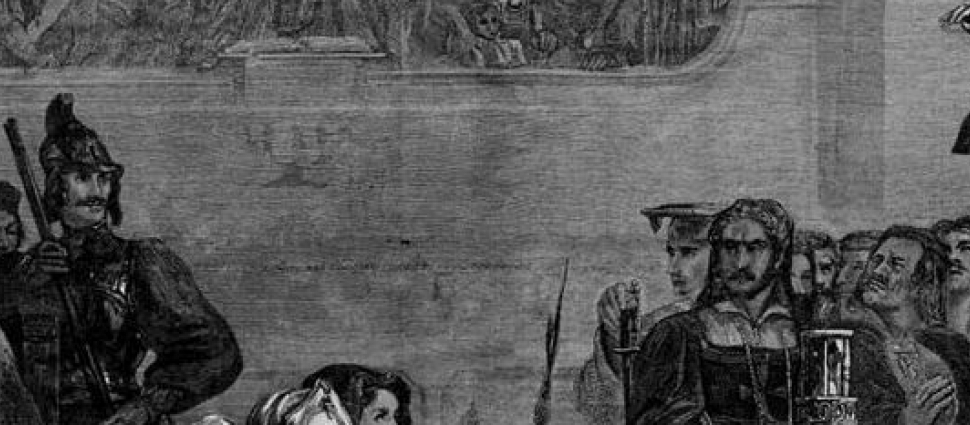John Knox and the Lord’s Supper: For Believers Only

Mar 2, 2017
If the Lord’s Supper is a great blessing, then who should partake of it? In this sacrament, ordained of God, who should come to the table of the Lord? Knox was abundantly clear: "But the Supper of the Lord, we confess to appertain to such only as be of the household of faith, [and who] can try and examine themselves as well in their faith as in their duty towards their neighbours" (Scots Confession in Reformed Confessions, 2:204). It is only those who are “in Christ” and of age to examine themselves who should partake of the Lord’s Supper.
Self-Examination
Knox focused often on the need for self-examination. He held that the Lord’s Supper should be partaken of "with all reverence, examining ourselves diligently before" (Scots Confession in Dennison, Reformed Confessions, 2:202.) Knox believed this should be done “because we are assured by the mouth of the apostle that such as eat of the bread and drink of that cup unworthily are guilty of the body and blood of the Lord Jesus” (Scots Confession in Reformed Confessions, 2:202). Paul, Knox noted, exhorted "all persons diligently to try and examine themselves before they presume to eat of that bread and drink of that cup" because "the danger [is] great if we receive the same unworthily, for then we be guilty of the body and blood of Christ our Saviour, we eat and drink our own damnation, not considering the Lord’s body" (Works, 4:192).
This self-examination should lead to practical consequences. Those living in open or grievous sin should not come to the Lord’s Table (Works, 4:193). Neither should those who are living in division with their brethren partake for "Such as eat or drink at that holy table without faith or being at dissention and disunion with their brethren do eat unworthily" (Scots Confession in Reformed Confessions, 2:204). Finally, those who lacked understanding of the nature the Lord’s Supper should not partake: "Moreover that the sacraments be rightly used, it is requisite that the end and cause why the sacraments were instituted be understood and observed, as well of the minister as the receivers" (Scots Confession in Reformed Confessions, 2:203). Conversely, those who should partake then were those who could "bring with them their conversion unto the Lord, by unfeigned repentance in faith; and in this Sacrament receive the seals and confirmation of their faith…" (Works, 3:74). The sacrament was then to be partaken of with “a truly penitent heart and lively faith" (Works, 4:192).
Church Examination
As well as self-examination, it was also the duty of ministers and elders to "take public and particular examination of the knowledge and conversation of such as are to be admitted to the table of the Lord Jesus" (Scots Confession in Reformed Confessions, 2:204). Therefore, "the administration of the Table ought never to be without that examination pass before, especially of those whose knowledge is suspect. We think that none are apt to be admitted to that mystery who cannot formally say the Lord's Prayer, the articles of the belief, and declare the sum of the law" (First Book of Discipline in Works, 2:240).
For Sinners
But with all this said regarding self-examination - the Lord’s table, for Knox, remained a table for sinners: "For the end of our coming together is not to make protestation that we are upright and just in our lives, but contrariwise, we come to seek our life and perfection in Jesus Christ, acknowledging in the meantime, that we of our selves be the children of wrath and damnation" (Works, 4:193-194). Indeed "…this Sacrament is a singular medicine for all poor sick creatures, a comfortable help to weak souls, and that our Lord requireth no other worthiness on our part, but that we unfeignedly acknowledge our naughtiness and imperfection" (Works, 4:194).
Rather than testify of any worthiness in the recipient, the Lord’s Supper testified of the sole sufficiency of Christ: "we present ourselves to this his Table … to declare and witness before the world that by him alone we have received liberty and life; that by him alone thou dost acknowledge us thy children and heirs; that by him alone we have entrance to the throne of thy grace; that by him alone we are possessed in our spiritual kingdom, to eat and drink at his Table…" (Works, 4:195). Thus, the Lord’s Table is not first or last about any individual, but about the sole sufficiency of Christ, and the wonder of his saving work.





